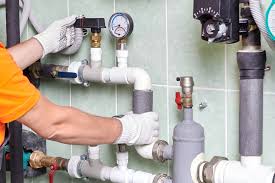
Running a business often involves managing a wide range of responsibilities, including maintaining the essential infrastructure that keeps your operations running smoothly. When plumbing issues arise, they can significantly impact your business, potentially causing disruptions and financial losses. Whether you’re dealing with a minor inconvenience or a major plumbing emergency, knowing how to handle the situation effectively is crucial. Here’s a comprehensive guide on what to do if you need a commercial plumber for your company.
Identify the Problem
The first step in addressing a plumbing issue is to clearly identify the problem. Common commercial plumbing issues include clogged drains, leaky pipes, broken water heaters, and malfunctioning toilets. Take note of specific symptoms such as unusual noises, low water pressure, or visible leaks. Documenting these details will help you communicate more effectively with a plumber and can assist in diagnosing the problem.
Assess the Urgency
Evaluate the urgency of the plumbing issue. Minor issues, like a small leak or a slow drain, may not require immediate attention, but they should still be addressed in a timely manner to prevent escalation. Major issues, such as a burst pipe or a sewage backup, require immediate attention to minimize damage and prevent operational downtime. Understanding the urgency will help you prioritize your response and manage the situation more effectively.
Find a Qualified Commercial Plumber
Finding a qualified commercial plumber is crucial for addressing your plumbing needs. Look for plumbers with experience specifically in commercial settings, as they will be familiar with the complexities of business plumbing systems. Key qualifications to check for include:
- Licensing and Certification: Ensure the plumber holds the necessary licenses and certifications required by local regulations. This ensures they are qualified to perform the work and adhere to industry standards.
- Insurance: Verify that the plumber has adequate insurance coverage to protect your business in case of accidents or damage during the job.
- Experience: Choose a plumber with a proven track record in handling commercial plumbing issues. Ask for references or case studies related to similar problems they have resolved.
You can start your search by asking for recommendations from other business owners or colleagues. Online reviews and ratings can also provide insight into the plumber’s reputation and reliability.
Contact the Plumber
Once you have identified a potential commercial plumber, reach out to them to discuss your needs. Provide detailed information about the problem, including any observations, the location of the issue, and the urgency of the situation. Clear communication helps the plumber understand the scope of the problem and prepare for the visit.
Inquire about the plumber’s availability and response time. For urgent issues, you may need a plumber who offers emergency services or has a rapid response time. Request a detailed estimate or quote for the service, including any potential additional costs. This ensures transparency and helps you avoid unexpected expenses.
Prepare for the Plumbing Service
Before the plumber arrives, make necessary preparations to facilitate their work. Clear the area around the affected plumbing fixtures to give the plumber ample space to operate. If applicable, shut off the water supply to minimize potential damage. Inform your employees about the plumber’s visit so they can assist with access and avoid interfering with the repair work.
Evaluate the Service
When the plumber arrives, they will assess the problem and propose a solution. They should explain the issue, the repair plan, and the cost involved. Take the time to review this information and ask any questions you may have. Ensure you understand the work to be done and agree on the pricing before the plumber begins.
After the work is completed, inspect the repairs to confirm that the issue has been resolved to your satisfaction. Check that all areas are clean and that there are no lingering problems. Request documentation of the work performed, including any warranties or guarantees, and keep it for future reference.
Implement Preventive Measures
To reduce the likelihood of future plumbing issues, consider implementing preventive maintenance measures. Regular inspections and maintenance can help identify potential problems early and extend the lifespan of your plumbing system. Establish a routine schedule for plumbing maintenance and ensure that your staff is aware of best practices for maintaining plumbing systems.
Conclusion
Addressing a plumbing issue promptly and effectively is essential for maintaining the smooth operation of your business. By identifying the problem, finding a qualified plumber, and ensuring clear communication, you can manage plumbing issues efficiently and prevent disruptions to your operations. With the right approach, you can resolve plumbing problems swiftly and safeguard your business against future issues.




